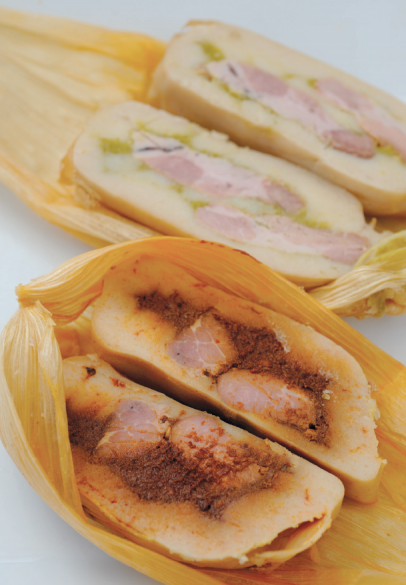In Search of Tamales in Philly
Known for an array of fantastic tacos, the Mexican spots of South Philly offer the holiday specialty almost every weekend—as long as you get up early.
Luz Jimenez is late to meet me at his South Philly taqueria, Los Gallos. The front door is locked, the persimmon dining room dark this early in the morning. I go around to the back and rap on the kitchen entrance’s peacock-blue back door on 10th Street, just north of Wolf, an intersection in an historically Italian-American neighborhood where, these days, the red-whiteand- green flags fluttering from row-home windows are just as likely to represent Mexico. Two cooks poke their heads out like curious chicks. I ask for Luz. They shake their heads no.
I go back up front and wait until a jangle of keys from inside Los Gallos heralds the arrival of Jimenez, who lives upstairs. “I’m sorry I was late,” he tells me later. “It was a busy, busy, busy weekend. I had to run to the produce market this morning.”
Compact and tan, the 34-year-old native of San Mateo Ozolco, a town of 500 people in the central Mexican state of Puebla, wears a polite smile and red basketball shorts. Even in the meager light of the Los Gallos prep kitchen, where we’ve gathered to make tamales, the traditional stuffed masa packages steamed in corn husks, it’s not difficult to see Jimenez is one of the hardest-working guys in the business. “Owning a restaurant, I have stress,” he says, more a sheepish admission than a complaint. “Always something happens.” Stress does not make for tender tamales. “In our culture, we say when you make tamales you have to be in a good mood, otherwise they will come out hard and dry.”
His early attempts certainly did. Los Gallos sells tamales only on Saturdays and Sundays, usually 100 per day, and Jimenez spent weekend mornings endlessly tinkering with his recipes. On a day he was especially pressed for time, cashier Carmen Rodriguez volunteered to prepare the day’s batch. “She never told me she knew how to cook,” Jimenez laughs, while Rodriguez streams lard into a mixing bowl of masa harina. “Later, when I tried Carmen’s [tamales], it was like ‘wow.’” She’s been making them for the restaurant ever since.
In Mexico, particularly in Puebla, tamales are a holiday food often tied into the country’s staunch Catholicism. “Any baptism, wedding, festival, we always make tamales,” but the biggest tamale day of the year is el Día de la Candelaria on February 2, 40 days after Christmas, both the halfway point between the winter solstice and the spring equinox and the day that marks the presentation of Christ at the temple.
Tamale prep for the Candelaria starts on January 6, when Mexicans celebrate el Día de Reyes, the visit of the three wise men to the newborn baby Jesus. Way better than gold, frankincense or myrrh, Mexicans make a roscón de reyes (“kings’ ring”), a round bread with little toys baked inside. “Whoever finds the toys has to help make the tamales on February 2.”
Rodriguez, who grew up in the village of Jesús María Acatla a hundred-and-change miles east of Jimenez’s hometown, is well versed in the tradition. “My family has been selling tamales for three generations in Mexico,” Rodriguez says in soft, fluid Spanish, with Jimenez translating. “When they started, they just made them at home. Friends and family would come to our house, and everybody liked them, so my parents decided to just do more and more, and it became their business.”
They have a tamale stand that sets up at local festivals and caters parties, Rodriguez explains while pressing a thin layer of the lardmoistened masa dough into a soaked corn husk. She shows me a piece of the pale blond dough. “The way you know that the masa is ready, you take a piece and you put in between your fingers. If the masa doesn’t stick on your hands then it’s good.”
Cupping the corn husk in her palm, Rodriguez places a few pieces of chopped braised pork loin on the masa, then a spoonful of Los Gallos’s herbaceous salsa verde. In three quick motions, the tamale is wrapped up into a neat rectangle and ready for the steamer. They take two hours to cook, and now I’m the one running late. I can’t stay, but
I’ll make it back to Los Gallos for tamales the following weekend. Jimenez and a few of his brothers—there are five in total, all having traded San Mateo for South Philly—are unloading ingredients from an old minivan parked in front of the taqueria with its blinkers on. “Actually we don’t have the tamales today,” Jimenez apologizes. Tomorrow is the Mexican Independence Day festival at Penn’s Landing, a celebration that will draw thousands of Mexicans and Mexican-Americans, and Los Gallos is catering. In Jimenez’s typical way, exhaustion and anxiety fray the edges of his pleasant demeanor, but he’s far too polite to be anything but warm and jovial to a customer passing on the street.
I think of Rodriguez, who’s raising two girls and a boy, in a land whose language she barely speaks. It’s not exactly the kind of stressfree situation that makes for soft, fluffy, happy tamales. Yet hers are. There’s strength and comfort in community and continuing traditions, and immigrants like Jimenez and Rodriguez are their own special, crucial variety of preservationist. Rodriguez’s children may grow up never knowing Jesús María Acatla, Mexico, but their holidays will have kings’ rings, and tamales.
TAMALE TRAIL
“Any time you’re dying for a tamale, you can go to any stand in Puebla,” says Jimenez. They’re not quite as easy to find in Philly, even as an estimated quarter to a third of Jimenez’s town of San Mateo have relocated here. Tamales rarely appear as part of restaurants’ regular menu, but many eateries make them on certain days of the week. Look for handmade signs taped into a window, the word “tamales” chalked onto a sandwich board, or fellow diners digging into the corn-husk-wrapped treats. With most spots, the trick is getting there early. —A. Erace
La Fonda de Teresita
1446 S. 8th St., 215.334.4500
A neon-tangerine sign advertises “Tamales Sabado y Domingo” in the window at La Fonda de Teresita, a new taqueria on 8th and Dickinson. They make three kinds of tamales every Friday, Saturday and Sunday, but they sell out fast. The Saturday I visited they were gone before 11am.
Café Con Chocolate
2100 S. Norwood St., 267.639.4506
You might have better luck off the beaten track at Café Con Chocolate, whose tamales are made by Lupe Bravo, the same masa mistress of Fiesta Acapulco. They are available daily.
Mole Poblano
1144 S. 9th St., 215.465.1616
This spot makes tamales with four fillings, including vegetarian rajas. They are only available on Saturday and Sunday and typically sell out by 10am.
San Andres Grocery
1137 S. 9th St., 215.462.0404
Unlike most other tamale sources, this shop usually makes them on Monday or Tuesday, upending everything I’d learned about tamales’ seeming weekend-treat status.
Fiesta Acapulco
1122 S. 9th St., 215.551.0850
This well-regarded taqueria on the southern end of the Italian Market makes one kind of tamale daily, though they typically sell out by early afternoon.
Fonda La Prima (AKA Prima Pizza Taqueria Mexicana)
1104 S. 9th St., 215.339.5000
They make two chicken-stuffed types: the traditional corn husk variety and another wrapped in banana leaf, as is the custom in Oaxaca and the Yucatán. Best of all, Fonda La Prima rarely sells out because tamales are made here every single day.
Los Gallos
951 Wolf St., 215.551.1245
On Saturday and Sunday mornings, you can choose from three kinds of tamales. Just set your alarm clock because they sell out early.





